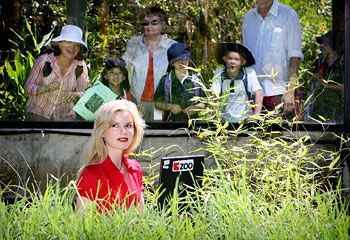 But while machines are becoming more human, people are being considered less human. I say this from the observation that increasingly human beings are being thought about and treated on a par with the beasts. An Australian zoo has recently launched a human project, where people will be caged in the zoo to emphasise that we are on the same level as the animals, as shown in this picture. (Read more about the human zoo project HERE.) I am reminded of some observations I made in my earlier post 'Man or Beast?'
But while machines are becoming more human, people are being considered less human. I say this from the observation that increasingly human beings are being thought about and treated on a par with the beasts. An Australian zoo has recently launched a human project, where people will be caged in the zoo to emphasise that we are on the same level as the animals, as shown in this picture. (Read more about the human zoo project HERE.) I am reminded of some observations I made in my earlier post 'Man or Beast?'One of the world's leading 'experts' in ethics is a man named Peter Singer. You can read about him HERE and visit his website HERE. In his article 'Taking Life' (which is available HERE) he argues that babies are not people until they develop characteristics such as rationality, autonomy, and self-consciousness. Yet he also believes that Great Apes are people. In fact, he is a founding member of the Great Ape Project, which seeks to persuade the United Nations to adopt a Declaration on Great Apes awarding personhood to great-apes. So apes would have more rights than babies if Mr. Singer gets his way.
To join my mailing list, send a blank email to phillips7440 (at sign) roadrunner.com with “Blog Me” in the subject heading.
To receive automatic notification every time new material is added to this blog, send a blank email to largerhope @ tiscali.co.uk with “Blog Me” in the subject heading. (Note: for anti-spam purposes, this email address has had spaced inserted before and after the @ sign. The address will only work after deleting these spaces).
Peter Singer doesn’t argue that “human babies aren’t people,” which is a description of biological fact – a member of the species Homo sapiens. In common parlance, “people” is a short-hand substitute for “human being.” Personhood, which you allude to in a slide-of-definition – from “human animal” to “personhood” or member of the moral community –, is determined by one’s capacity to have preferences for Peter Singer (as opposed to genetic material which logically parallels the sexist who cites the genetic fact of “sex” as the moral qualifier), which is necessarily predicated on sentience, or, for Singer, the ability to suffer. Therefore, the qualifications as you cite them, “rationality, autonomy, and self-consciousness,” are not necessary for personhood or to be the kind of being whose interests ought to be given equal consideration to the like interests of others. Those qualifications are cited to circumvent and prove illogical the traditional speciesism that underlies the concept of personhood: On these qualifications, inevitably, some human animals are going to possess the traits to a lesser degree than some nonhuman animals so why are the former but not the latter considered possessors of moral rights?
ReplyDeleteIt follows (from sentience) that human babies, therefore, will have less rights (e.g. liberty) than an adult great ape (other than human animals, which are a species of great ape of course) because the human baby isn’t the kind of being with the preference or capacity to realize “liberty” or freedom-from whereas the ape is. Likewise in the case of adult human animals and human babies – the former will have “more rights” than the latter because their capacities are different. It simply doesn’t make sense to argue that a human baby has a right to autonomy because she lacks the capacity to realize it, however, it does make sense to argue that an adult chimpanzee does. Both, however, because they can suffer, ought to be given equal consideration of like interests and therefore have rights (if Peter Singer has his way that is).
Furthermore, the argument in the “human zoo project” isn’t that human animals are “on the same level” as nonhuman animals. The purpose is to challenge the erroneous ontological dualism – man/beast – often assumed in Ethics, and to investigate speciesism. As it is absurd to argue that mentally challenged human beings are “on the same level” as Plato, by any objective standard you want to appeal to (e.g., rationality, intelligence, capacity to solve complex problems, language use), it is likewise absurd to argue that all groups of animals (human or otherwise) are “on the same level.” It is absurd because it doesn’t mean anything unless you A) presuppose speciesism and B) leave unanswered the begged question: What make’s human animals so special?
Peter Singer is concerned with suffering and the realization of interests; that is what makes a Life, not simply genetic material or a beating heart.
http://thatvegangirl.com/